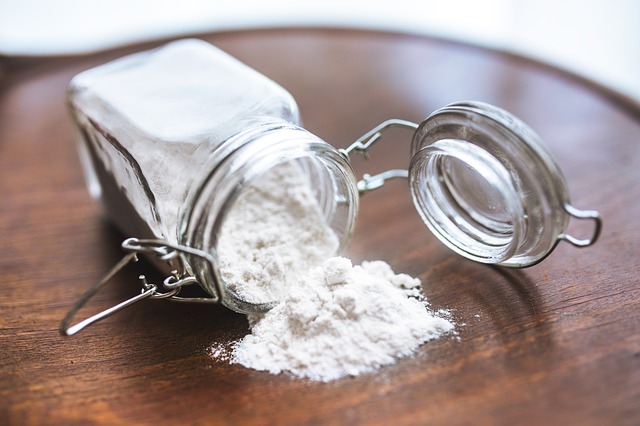Cornstarch is a white, powdery substance most commonly used to thicken liquids. Cornstarch is naturally gluten-free, since it is derived from corn. Because cornstarch is flavorless, its presence in recipes often goes undetected; this is part of what makes it a great thickening agent. However, when cornstarch is not available, or if you’re looking for another option, many items can be used in its place.
Cornstarch Substitutes
1. Flour

- Substitute three tablespoons of flour for every one tablespoon of cornstarch.
Flour is an excellent substitute for cornstarch, and it’s a common pantry item. Unlike cornstarch, however, flour won’t add a silky sheen to the finished product. Instead, it creates something of a flat look. When using flour as your thickening agent, you should cook whatever you have thickened slightly longer to reduce the flavor of raw flour. When working with flour, you’ll want to stir or whisk very well to ensure there are no clumps. If the clumps are not broken up, not only will the consistency be lumpy, but you will also not achieve the appropriate thickness in your mixture.
2. Arrowroot Flour

- Substitute two tablespoons of arrowroot flour for every one tablespoon of cornstarch.
Like cornstarch, arrowroot flour is gluten-free, high in fiber, and produces a glossy sheen when added to products. It is made from a plant of the same name. Arrowroot flour doesn’t hold up as well to extended cooking, however, so be sure to avoid it if you still need to heat your dish. If arrowroot flour is your only available substitute and heat is needed, wait to add it as late as possible.
3. Potato Flour

- Substitute one tablespoon of potato flour for every one tablespoon of cornstarch.
Like cornstarch, potato flour is gluten-free. Potato flour is also bland in flavor, so it won’t affect the taste of your final product. Make sure to whisk this mixture well, however. Potato flour tends to clump, and it could change the texture of your dish. Much like regular wheat flour, achieving the right consistency relies on being able to break up and dissolve any lumps.
4. Tapioca Flour

- Substitute one tablespoon of tapioca flour for every one tablespoon of cornstarch.
Tapioca flour is a gluten-free thickening agent best used in dishes that require refrigeration. Cornstarch tends to jellify, but tapioca flour does not. Like cornstarch, however, tapioca flour produces a sheen that makes for a beautiful presentation, especially for desserts. The one-to-one ratio makes tapioca flour an easy go-to substitution for cornstarch.
5. Instant Mashed Potatoes

- Substitute one tablespoon of instant mashed potatoes for every one tablespoon of cornstarch. Add more if needed.
Believe it or not, instant mashed potatoes can be used to thicken your soups or gravies when you’re in a jam. We recommend processing the mashed potatoes first to avoid any clumping in your mixture.
6. Glucomannan

- Substitute one-fourth of a teaspoon of glucomannan powder for every two teaspoons of cornstarch.
Glucomannan powder, also known as konjac fiber, is a tasteless substance that can be used in place of cornstarch. It is pure fiber and contains no calories or carbs, making it an excellent substitution for those on a ketogenic diet.
7. Rice Flour

- Substitute two tablespoons of rice flour for every one tablespoon of cornstarch.
Naturally gluten-free, rice flour is made from ground rice. It takes a long time to thicken a product, however, so it isn’t the best option if you’re in a hurry. Rice flour can work well for foods that need to rest or cook for a while because of the extra time it takes to absorb moisture.
8. Almond Flour

- Substitute one tablespoon of almond flour for every one tablespoon of cornstarch.
Almond flour is made from ground, blanched almonds. This gluten-free thickening agent is another great cornstarch substitute for those on the ketogenic diet. Its sweet and nutty flavor makes it better suited for sweeter dishes, however. You may even find you like the added flavor profile, in which case, you can use more than the recommended ratio to further bring out a nutty flavor in your dish.

In short, flour and instant potatoes are great options when you’re in a pinch. The other substitutes present some fantastic health benefits, many containing added nutrients such as fiber, protein, and other vitamins and minerals.
Some substitutions are better suited for those on specific diets: if you’re avoiding gluten, you could substitute arrowroot flour, potato flour, tapioca flour, rice flour, or almond flour for cornstarch. If you’re on the ketogenic diet, you could try substituting almond flour or glucomannan powder.
All of these substitutes provide thickening action comparable to that of cornstarch and would work well in your recipes when you need another option.
